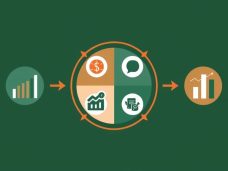Discover the ultimate strategy for first-time real estate investors to eliminate housing costs while building equity. House hacking combines smart property selection with rental income to cover your mortgage, allowing you to live essentially for free while creating long-term wealth. Learn how everyday people are using this approach to accelerate their financial independence.
Key Takeaways:
- Understand how house hacking can eliminate your housing expenses while building equity
- Learn different house hacking strategies for single-family homes, duplexes, and multi-unit properties
- Discover financing options specifically designed for house hackers, including low down payment programs
- Master tenant selection and management to ensure positive cash flow and maintenance of your property
- Explore tax advantages that make house hacking even more financially attractive
Introduction: The House Hacking Revolution
Housing expenses typically consume 30-40% of the average American’s income. What if you could redirect this substantial expense into building equity and generating wealth? That’s the fundamental premise of house hacking – purchasing a property, living in one portion, and renting the remainder to offset or completely cover your mortgage and expenses.
This strategy has gained tremendous popularity among first-time real estate investors and millennials looking to enter the housing market while maintaining financial flexibility. More than just a creative living arrangement, house hacking represents a powerful wealth-building strategy that combines forced savings, leverage, and passive income generation.
Understanding the House Hacking Concept
At its core, house hacking involves:
- Purchasing a residential property (single-family, duplex, triplex, or fourplex)
- Living in one unit or portion of the property as your primary residence
- Renting the remaining space to tenants whose payments cover most or all of your housing costs
While the concept is straightforward, successful implementation requires careful planning, financial analysis, and property management skills. The rewards, however, can be significant – essentially eliminating your housing costs while simultaneously building equity in an appreciating asset.
House Hacking Strategies for Different Property Types
Strategy 1: Single-Family Home with Roommates
- How it works: Purchase a single-family home with multiple bedrooms and rent out the spare rooms while occupying the primary bedroom.
- Ideal for: Singles or couples without children who are comfortable with shared living spaces.
- Financial structure: Mortgage payments are partially or fully offset by roommate rent.
- Pros: Lowest barrier to entry; conventional financing with 3-5% down payment; easier to transition to a full rental property later.
- Cons: Less privacy; potential roommate conflicts; typically generates less cash flow than multi-unit properties.
Strategy 2: Duplex, Triplex, or Fourplex Living
- How it works: Purchase a small multi-family property (2-4 units), live in one unit, and rent out the others.
- Ideal for: Those seeking more privacy while maximizing rental income.
- Financial structure: Rental income from other units covers mortgage and often provides additional cash flow.
- Pros: Stronger cash flow; designated private living space; economies of scale for maintenance.
- Cons: Higher purchase price; potentially more complex property management responsibilities.
Strategy 3: Accessory Dwelling Unit (ADU) Approach
- How it works: Purchase a property with an existing ADU (like a basement apartment, garage apartment, or detached guest house) or add one to a single-family home.
- Ideal for: Those who want significant privacy with just one tenant relationship.
- Financial structure: ADU rental income offsets a significant portion of housing costs.
- Pros: Maintains most benefits of single-family living while generating rental income; potential for appreciation through property improvement.
- Cons: Upfront renovation costs if adding an ADU; zoning restrictions in some areas.
Strategy 4: Short-Term Rental House Hack
- How it works: Purchase a property in a tourist area or near major attractions and rent out portions on platforms like Airbnb while living there.
- Ideal for: Individuals with flexible schedules in high-demand tourist areas.
- Financial structure: Premium short-term rental rates can exceed traditional rental income, potentially generating significant cash flow.
- Pros: Higher income potential; flexibility to block off rental availability when desired.
- Cons: More active management required; seasonal income fluctuations; increasing regulations in many markets.
Finding the Ideal Property for House Hacking
Successful house hacking begins with selecting the right property. Key considerations include:
Location Factors
- Job growth: Areas with strong employment opportunities attract stable tenants
- Proximity to amenities: Properties near universities, hospitals, public transportation, and commercial centers tend to attract consistent rental demand
- Neighborhood quality: Safe neighborhoods with good schools command higher rents and attract responsible tenants
- Future development: Areas with planned infrastructure improvements often experience appreciation
Property Characteristics
- Separate entrances: Ideal for maintaining privacy between living spaces
- Multiple bathrooms: Essential for comfortable shared living situations
- Layout flexibility: Properties that naturally divide into separate living areas
- Parking availability: Sufficient parking for multiple tenants reduces conflicts
- Renovation potential: Properties where strategic improvements can increase rental income
Financial Metrics to Evaluate
Before purchasing, calculate these key figures:
- Total monthly housing cost: Mortgage, taxes, insurance, utilities, and maintenance
- Potential rental income: Realistic market rates for the units or rooms you’ll rent
- Cash flow analysis: Difference between housing costs and rental income
- Return on investment (ROI): Annual return relative to your down payment and closing costs
- Debt-to-income ratio: Ensures you qualify for financing even without counting potential rental income
Financing Your House Hack
Favorable financing options make house hacking particularly attractive for first-time investors:
Owner-Occupied Loan Programs
- FHA loans: 3.5% down payment for properties with 1-4 units; must live in the property for at least one year
- VA loans: 0% down payment for qualifying veterans; can be used for properties up to four units
- Conventional 97 loans: 3% down payment program for first-time homebuyers
- HomeReady and Home Possible: Fannie Mae and Freddie Mac programs offering low down payments for moderate-income borrowers
Financing Considerations
- Debt-to-income requirements: Typically must be below 43%, though some loan programs may consider future rental income
- Reserve requirements: Most lenders require cash reserves beyond the down payment
- Interest rates: Owner-occupied properties receive better rates than investment properties
- Mortgage insurance: Required for most low down payment programs until reaching 20% equity
Creative Financing Approaches
- House hacking partnerships: Pooling resources with friends or family members
- Seller financing: Negotiating direct payment terms with the property seller
- Assumable mortgages: Taking over the seller’s existing mortgage (especially valuable in high-interest environments)
- Renovation loans: FHA 203(k) and Fannie Mae HomeStyle loans that combine purchase and renovation costs
Managing Tenants as a House Hacker
Since you’ll be living alongside your tenants, effective tenant management becomes especially important:
Tenant Screening Best Practices
- Clear qualification standards: Income requirements, credit scores, background checks
- Thorough application process: Employment verification, previous landlord references
- Compatibility considerations: Lifestyle alignment with your own (especially for roommate scenarios)
- Setting expectations: Hours, noise levels, shared space usage, guest policies
Legal Considerations
- Written lease agreements: Even with friends or relatives as tenants
- State and local rental laws: Tenant rights, security deposit handling, eviction procedures
- Insurance requirements: Proper landlord coverage for rented portions
- Fair housing compliance: Understanding anti-discrimination laws
Building Positive Tenant Relationships
- Clear communication channels: Established methods for maintenance requests
- Professional boundaries: Balancing landlord responsibilities with neighborly relations
- Regular property inspections: Ensuring proper maintenance while respecting privacy
- Conflict resolution strategies: Addressing issues promptly and fairly
Financial Benefits Beyond Free Housing
While eliminating housing costs is the most immediate benefit, house hacking offers several additional financial advantages:
Equity Building
- Mortgage principal reduction: Tenants essentially help pay down your loan
- Property appreciation: Historical real estate appreciation averages 3-5% annually
- Forced appreciation: Strategic improvements that increase property value
Tax Advantages
- Depreciation deductions: Allocating a portion of property value as a tax write-off
- Operating expense deductions: Repairs, management fees, insurance, property taxes
- Home office deductions: If you operate a business from your portion
- 1031 exchange potential: Tax-deferred exchange into a larger investment property when you move out
Wealth Acceleration
- Improved debt-to-income ratio: As rental income increases, ability to qualify for additional properties improves
- Experience building: Learning property management and investment skills with minimal risk
- Portfolio expansion: Using equity and cash flow to acquire additional properties over time
Common House Hacking Challenges and Solutions
Challenge: Privacy Concerns
Solution: Prioritize properties with natural separation between living spaces, separate entrances, and soundproofing. Establish clear boundaries and common area usage schedules.
Challenge: Property Management Responsibilities
Solution: Create systems for routine maintenance, tenant communication, and emergency responses. Consider hiring professional help for specific tasks like lawn care.
Challenge: Difficult Tenants
Solution: Implement thorough screening processes, clear lease agreements, and prompt addressing of concerns. Maintain professional landlord-tenant relationships despite proximity.
Challenge: Financing Hurdles
Solution: Work with mortgage brokers experienced in house hacking strategies. Consider housing counseling programs that offer guidance on available loan options.
Challenge: Zoning Restrictions
Solution: Research local regulations thoroughly before purchasing. Some areas restrict unrelated roommates, ADUs, or short-term rentals.
The House Hacking Exit Strategy
Most house hackers eventually transition to their next property. Consider these exit options:
Option 1: Keep as a Rental Property
Convert your house hack to a full rental property when you move out. With the financing already in place at owner-occupied rates and operational experience with the property, this typically creates an immediately cash-flowing investment.
Option 2: Sell and Utilize Tax Benefits
If you’ve lived in the property for at least two years, you can potentially exclude significant capital gains from taxes ($250,000 for individuals, $500,000 for married couples).
Option 3: Rinse and Repeat
Move to another property and implement the house hacking strategy again, building a portfolio of properties over time with minimal additional out-of-pocket investment.
Option 4: House Hacking Graduation
Use the equity, experience, and cash flow from your house hack to transition into larger multifamily properties or commercial real estate investments.
Real-Life Success Stories
Case Study 1: The Duplex Starter
Sarah, a 28-year-old teacher, purchased a $300,000 duplex with an FHA loan and 3.5% down payment ($10,500). She lives in one unit and rents the other for $1,400. Her total monthly payment is $1,950, meaning her personal housing cost is just $550 monthly while building equity in a valuable asset.
Case Study 2: The Single-Family Maximizer
Michael bought a 4-bedroom house near a university for $280,000. He occupies the master bedroom and rents the other three rooms to students for $600 each. His $1,800 in rental income exceeds his $1,650 monthly mortgage payment, generating positive cash flow while living for free.
Case Study 3: The ADU Creator
Jessica purchased an older home with an unfinished basement for $320,000. She invested $35,000 to convert the basement into a legal apartment with a separate entrance. The basement now rents for $1,100 monthly, covering nearly 70% of her mortgage payment and significantly reducing her housing expenses.
Is House Hacking Right for You?
House hacking works best for individuals who:
- Value financial efficiency over maximum privacy
- Can qualify for residential property financing
- Are comfortable with basic property management
- Have lifestyle flexibility for landlord responsibilities
- Are focused on building long-term wealth
- Live in markets with favorable rent-to-price ratios
While not suitable for everyone, house hacking represents one of the most accessible entry points into real estate investing and accelerated financial independence.
Getting Started: Your House Hacking Action Plan
- Assess your finances: Determine your down payment capacity, credit score, and financing options
- Research local markets: Identify neighborhoods with favorable rent-to-price ratios
- Build your team: Connect with real estate agents familiar with house hacking and investment properties
- Analyze potential properties: Calculate potential cash flow and returns for properties that match your criteria
- Secure financing pre-approval: Work with lenders who understand house hacking strategies
- Create a tenant management plan: Establish policies, application processes, and lease agreements
- Develop an exit strategy: Determine your long-term plans for the property
The Bottom Line
House hacking represents a powerful financial strategy that transforms housing from an expense into an investment. By leveraging favorable owner-occupied financing, rental income, and tax advantages, house hackers can eliminate their housing costs while building wealth through real estate.
Whether you’re a young professional looking to get ahead financially, a real estate enthusiast seeking your first investment, or someone simply tired of paying rent with nothing to show for it, house hacking offers a proven path to accelerated financial progress and real estate portfolio building.
Disclaimer: This article is for informational purposes only and does not constitute financial or real estate advice. Always consult with qualified professionals regarding your specific situation before making investment decisions.
Last Updated: March 23, 2025
Frequently Asked Questions About House Hacking
What credit score do I need for house hacking?
Most loan programs require a minimum credit score of 580-620 for FHA loans and 620-640 for conventional financing. However, higher scores (700+) will secure better interest rates and loan terms. If your score is below these thresholds, focus on credit improvement strategies for 3-6 months before applying for financing.
How much money do I really need to get started with house hacking?
Beyond the down payment (typically 3-5% for owner-occupied properties), budget for closing costs (2-5% of purchase price), inspection fees ($300-500), moving expenses, initial repairs, and cash reserves (typically 2-6 months of housing payments). For a $300,000 property, expect to need $15,000-25,000 total to get started comfortably.
Will lenders consider potential rental income when I apply for a mortgage?
Most conventional lenders will consider a portion (typically 75%) of potential rental income when qualifying for a mortgage on a multi-unit property if you can document market rents. For single-family homes with roommate rental plans, lenders generally won’t factor in potential rent. For established rental properties, lenders will typically require documentation of existing lease agreements.
What happens if I can’t find tenants right away?
Having 3-6 months of housing payment reserves is critical to cover periods of vacancy. To minimize vacancy risk, research rental demand thoroughly before purchasing, have marketing materials prepared before closing, and consider pre-leasing units when possible. Also consider temporary solutions like month-to-month rentals or furnished short-term options while seeking long-term tenants.
How do I handle maintenance and repairs while house hacking?
Develop relationships with reliable contractors before emergencies arise, build a maintenance fund (typically 1-2% of property value annually), learn basic home repair skills for minor issues, and create clear procedures for tenants to report maintenance needs. Consider home warranty programs for major systems and appliances to help manage unexpected repair costs.
Can I house hack with a family or children?
Yes, though it requires more careful property selection. Focus on multi-unit properties with appropriate separation between units rather than roommate situations. Duplexes and properties with ADUs work particularly well for families. Consider sound insulation, separate entrances, and clearly defined outdoor spaces to maintain privacy and minimize conflicts.
What are the tax implications of house hacking?
You can typically deduct expenses for the rental portion of your property, including a percentage of mortgage interest, property taxes, insurance, repairs, and depreciation. Track all expenses carefully and maintain clear documentation of the square footage allocation between personal and rental use. Consider working with a tax professional experienced in real estate investing to maximize legitimate deductions.
How long should I house hack before moving on?
Most house hackers remain in their properties for 2-5 years. The minimum recommendation is two years to qualify for capital gains tax exclusions if you sell. The ideal timing depends on your equity position, cash flow, market conditions, and personal circumstances. Many successful investors continue house hacking through multiple properties before transitioning to traditional rentals or larger investments.
What are the biggest mistakes house hackers make?
Common mistakes include underestimating expenses (particularly maintenance and vacancy costs), insufficient tenant screening, failing to treat it as a business, not understanding landlord-tenant laws, purchasing in low-appreciation neighborhoods to maximize immediate cash flow, and neglecting exit strategy planning. Address these potential pitfalls through education and careful planning before purchasing.
Can I use house hacking to qualify for more properties faster?
Absolutely. After 12 months of documented rental income, most lenders will consider this income when qualifying for additional properties. House hacking creates a track record as a landlord, improves your debt-to-income ratio through rental income, builds equity through loan paydown and appreciation, and generates cash flow that can be saved toward future down payments—all factors that accelerate additional property acquisitions.



